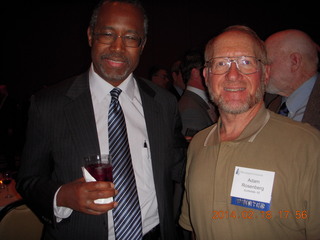FIVE PILLARS OF AMERICA
2014 December 19
America is not a new idea.
It is the culmination of a spirit that started in 1215,
eight hundred years ago (give or take a few months)
with the Magna Carta in England.
This vision is not a utopian dream,
rather it is a realization of what we can achieve
with people as we actually are,
capable of great achievements while
only a few steps away from unspeakable savagery.
It took 575 years (give or take a few months)
to bring this vision to a hard reality
in the form of the Constitution of the United States.
(Waiting six centuries for an idea to become reality
is patience beyond my imagination.
There is an ever-so-patient tree
on the Navajo Loop at Bryce Canyon
that grew for about seven centuries
before it ever saw the sun.)
 The vision is that we can build a republic based on simple values
and we have to realize these values must remain inviolate
and the rights must remain inalienable
for it to continue to serve its citizens.
Human life, liberty, livelihood, property, and contract
are the key rights.
Let's look at them for few paragraphs.
The vision is that we can build a republic based on simple values
and we have to realize these values must remain inviolate
and the rights must remain inalienable
for it to continue to serve its citizens.
Human life, liberty, livelihood, property, and contract
are the key rights.
Let's look at them for few paragraphs.
"Human Life" isn't too hard.
We have pretty-well-defined criteria for when
it's okay to kill somebody else.
Defining our physical persons from imminent danger
or protecting our domiciles from invasion
are deemed acceptable circumstances for killing an aggressor.
Otherwise, "thou shalt not kill" is pretty much the law we have.
There are breaches, to be sure,
and questions of when law enforcement can stretch those limits,
but,
in my anything-but-humble opinion,
the fundamental problems we're having in our American society
are not stemming from abuse of the right to life.
"Liberty" is a too-often-abused word.
We talk about rights to speech, religion, travel, press, and privacy
with the expectation that these should be protected and provided
by our society and our government.
I'm comfortable with the former on both,
that we should aggressively protect rights for each other.
If people wants to say something or to go somewhere,
then I'm all in favor of others respecting their choices.
That doesn't absolve people from facing the consequences
of those choices,
Oliver Wendell Holmes's famous example
of shouting "Fire!" in a crowded theater being my favorite example.
The first amendment of our Constitution doesn't
say you can say anything you want,
only that no law may prohibit
your exercise of free speech.
Slander, libel, or criminal consequences
are still your responsibility when you use your rights.
Our society should be biased in favor of freedom of choice,
and that same society should feel comfortable
with people facing the consequences of their choices.
That same liberty and choice applies to sexuality and drugs
and education and career.
I may not like your choices,
but they're your choices and,
so long as they don't intrude on me,
it's not my business to intrude forcefully.
(I'm still going to try to persuade my friends to make wiser choices.)
I prefer "liberty" to "freedom" or being "free."
Too many people today echo Abbie Hoffman's line,
"Free means you don't pay."
American "freedom" isn't about how much you can get "for free,"
but rather how free we are to pursue our own visions.
"Livelihood" is the realization of the "pursuit of happiness."
Calvin Coolidge said the business of American is business
and I whole-heartedly agree.
We should feel comfortable with people making a living,
even doing things we don't particularly like.
We also should be respectful of those earning their keep.
"If you don't ship, you're overhead," one friend said to me.
There was a line in the movie "Risky Business,"
"In a sluggish economy, never ever
fuck
with another man's livelihood."
As an American,
I'm intensely proud of my opportunity to sign the front
of a dozen paycheques.
(It's direct deposit these days,
so signing the front of payroll cheques every two weeks
is metaphorical rather than physical.)
Taxing that livelihood is theft, plain and simple.
America accepts a breach of morality for a few specific services
such as national defense and federal courts
with the understanding that we all contribute equally.
Asked how much of the national tax burden
should be paid by the wealthiest five percent,
an American answers "five percent" without hesitation.
Economic success or failure should not be factor in tax paid,
not a century ago and not today.
It's time to respect people who work, and people who produce.
We sang songs venerating those who worked hard on railroads,
in coal mines, pulling barges, driving eighteen-wheel trucks,
and making our economy flourish in other ways.
Labor unions gave workers a chance to present a unified and qualified
work force to employers and there's no reason they can't do so again.
"Property" is the fourth pillar of American values.
Not only what we earn but what we have should be sacred.
The notion that we can take what we want
from those we don't like is obscene,
more obscene when the theft is taxation,
and every so much more so when that obscenity is veiled
by self-righteous sanctimony about generosity and helping the poor.
We have to remove the notion that theft in a good cause is okay,
we have to remove
the naked jealousy and bare envy of the Occupy movement
whose adversaries were simply and purely
those who have been successful.
"Contract" is the final step,
as in Ayn Rand's catch phrase "the sanctity of contract."
If you give your word, then you keep your word,
and that value should permeate our dealings with each other.
Not every promise can be kept,
there are "extenuating circumstances," as the lawyers say,
but we expect "good faith effort" to comply with our word
and good compensation from those who fail.
It's part of the deal.
Having a clear understanding of what is expected often isn't easy,
but deliberately misleading people clearly isn't right.
Those of us who travel have oodles of stories
in foreign countries where services were offered and reneged.
My last two trips had sad stories of changing the rules,
where an airline in Australia cost me AU $1100 (US $940)
and a hotel in London cost me GBP £180 (US $380).
My right-wing, US-conservative reaction
was not just that I had been robbed but that
this was gosh-darned un-American.
A contract was made, terms were agreed to,
nothing unexpected happened, and they didn't live up to their part.
Another example that happened to somebody else
is seeing a bowl of nuts at the restaurant table in Rome,
sampling those nuts,
and finding out that those nuts are quite expensive if one eats them.
In Mexico we were offered an open bar from six to seven
and a cash bar afterward.
They kept us outside for a long time,
they let us in at quarter to seven,
took our beverage orders,
and delivered our drinks at 7:02 with a bill.
Sure, this crap happens stateside,
maybe more recently than in years past,
and we feel, and we should feel,
it is smarmy and slimy and sleezy and wrong.
 What does life under these values offer?
(As much as libertarians preach the "normative" case
of doing the right thing for its own sake,
I justify a set of values by what it produces.)
What does life under these values offer?
(As much as libertarians preach the "normative" case
of doing the right thing for its own sake,
I justify a set of values by what it produces.)
First and foremost,
these American values produce a fabulously wealthy society
at all income levels.
Before progressive taxation and progessive regulation
America had the richest rich people in the world,
the richest poor people in the world,
and a rapidly emerging middle class.
Circa 1900 America had a flow of eager immigrants.
There were no welfare payouts, no federal guarantees,
no benefits, just more jobs than you could shake a stick at.
The best defense against low wages is more jobs
so people have the choice not to work for next to nothing.
Shitty jobs like the fast-food industry and Walmart
are starter, entry jobs and people should have someplace else to go
rather than having to work at those jobs forever
listening to people campaigning for minimum wages
that would make them unable to work at all.
How much better off would a free economy be?
Well, the Carter administration took about one-third
of the U.S. economy just by itself
and the past eight years under the same political party
have taken a similar-sized bite in American productivity.
(A favorable balance of trade of Chinese imports
has softened the blow in this century,
but it will be felt,
maybe not today, maybe not tomorrow,
but soon, and for the rest of our lives.)
If we believe, as I do, there was decay under both major parties,
then we have to figure we've lost a factor of two, three, or more,
at every level of the income ladder.
Look at it this way.
Our technology has grown enormously and yet we have had less
in the United States each year since about 1966.
Think how much the regulatory environment of 1913 would produce today.
The grumbling about anti-trust and abuse of labor
wouldn't be issues in the Information Age of the Internet.
Look at it another way.
Almost all subsidy programs pay people to be poor and penniless.
Those who save for college don't get grants for their kids' tuition.
Those who earn their incomes don't qualify for relief programs.
Those who maintain two-parent families
don't qualify for broken-home subsidies.
We don't hear much lately about the "American dream"
which is the mainstay of a proud, productive economy here.
What about helping the poor?
What about schools?
What about roads?
These are problems that were taken care of in America
before big government.
The primary effect of government redistribution
is to make people feel
they're already being generous in taxing others,
so they don't have to give of themselves.
Maybe that's why conservatives who don't earn as much as liberals
give so much more to charity.
We recognize if we want the world to become a better place,
then we're the ones who can make it happen.
America is also about choice.
Some like their vacations on the beach,
some like the mountains,
and some like to spend their vacations at home.
Some even like to tell jokes that other people don't like,
part of the price of liberty.
I know it will shock people to find out that
some people don't like some other people,
perhaps based on race, religion, or sex.
As an American,
I'm comfortable that I might not be welcome in some clubs.
Unlike Groucho Marx,
I'm also comfortable that I'm not going to join those clubs.
There might be clubs where people smoke cigarettes
just as there are still airlines that serve peanuts
when the majors have switched to pretzels and other snacks.
(Somebody might be allergic.)
 America isn't going to have laws against gay marriage
or non-destructive drugs or even abortion.
(Even the Bible is pro-choice on the abortion issue.)
America also wouldn't dream of forcing any institution
to support gay marriage or drugs, either.
No church would be compelled to offer same-sex weddings
and no taxpayer would be hit for subsidies for abortions
or preventing people from using drugs.
America isn't going to have laws against gay marriage
or non-destructive drugs or even abortion.
(Even the Bible is pro-choice on the abortion issue.)
America also wouldn't dream of forcing any institution
to support gay marriage or drugs, either.
No church would be compelled to offer same-sex weddings
and no taxpayer would be hit for subsidies for abortions
or preventing people from using drugs.
Some have associated the American ethic with Christianity
and this is wrong.
One I deeply respect once opined,
"Religion is the right profile
of the monster whose left side is politics."
The religious-right movement that put "under God"
in the
Pledge of Allegiance
and "In God We Trust"
in place of "E Pluribus Unum" as our motto
misses a major point, perhaps the most important point.
Except in the broadest brushstrokes,
the ethics of life, liberty, livelihood, property, and contract
are not religious in nature.
The same Bible these people thump
forbids the pornography these people download,
the prostitutes they hire,
and many other things we all do with comfort,
and should do with comfort.
Anybody comfortable with "under God" in the Pledge
and uncomfortable with "under Allah" in the Pledge
is missing the point.
(So are people who get all snippy about nativity scenes
and Christmas trees in town squares.
Just because most Americans
like Christian symbols in the holiday season
doesn't mean anybody is forcing anybody to become a Christian.)
For good reason
there is no mention of any diety in
the Constitution of the United States
and only the mention of
"the Laws of Nature and of Nature's God"
in the Declaration of Independence
when referring to what we humans are like
and to what we are entitled.
That's it.
The only use of un-named "He" in the Declaration of Independence
is to King George III, not the Lord in heaven.
Religion is a personal matter
(protected by Liberty),
not part of our system of government.
The best part of these five pillars
is they protect our ability to have fun.
Material wealth gives us ability to do things we like to do
and liberty gives us the choice to pursue them.
America means I can drive where I want,
fly where I want,
take a boat where I want,
and do what I want when I get there.
I don't have to get permission from the government
or even tell the government where I'm going and what I'm doing
'cuz it's none of their damned business.
Sure, I have to respect the rights and liberty of others,
but our country is big enough for everybody
with enough jobs for everybody
and enough fun for everybody.
If you want more of this kind of material
then
here
are my American-issues essays.
THE ADAM HOME PAGE
adam@the-adam.com
 The vision is that we can build a republic based on simple values
and we have to realize these values must remain inviolate
and the rights must remain inalienable
for it to continue to serve its citizens.
Human life, liberty, livelihood, property, and contract
are the key rights.
Let's look at them for few paragraphs.
The vision is that we can build a republic based on simple values
and we have to realize these values must remain inviolate
and the rights must remain inalienable
for it to continue to serve its citizens.
Human life, liberty, livelihood, property, and contract
are the key rights.
Let's look at them for few paragraphs.

